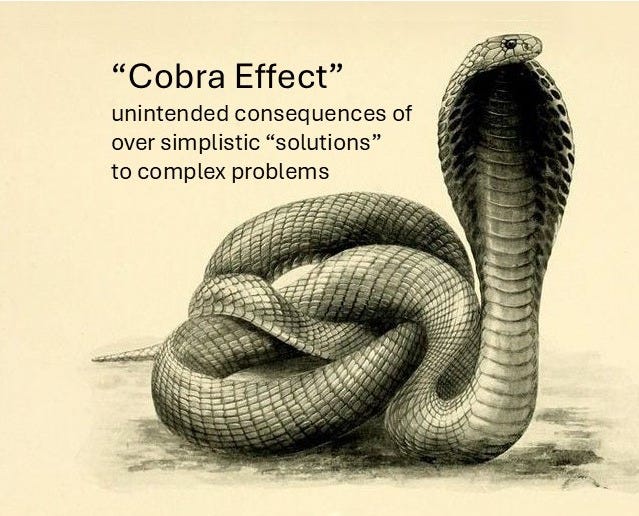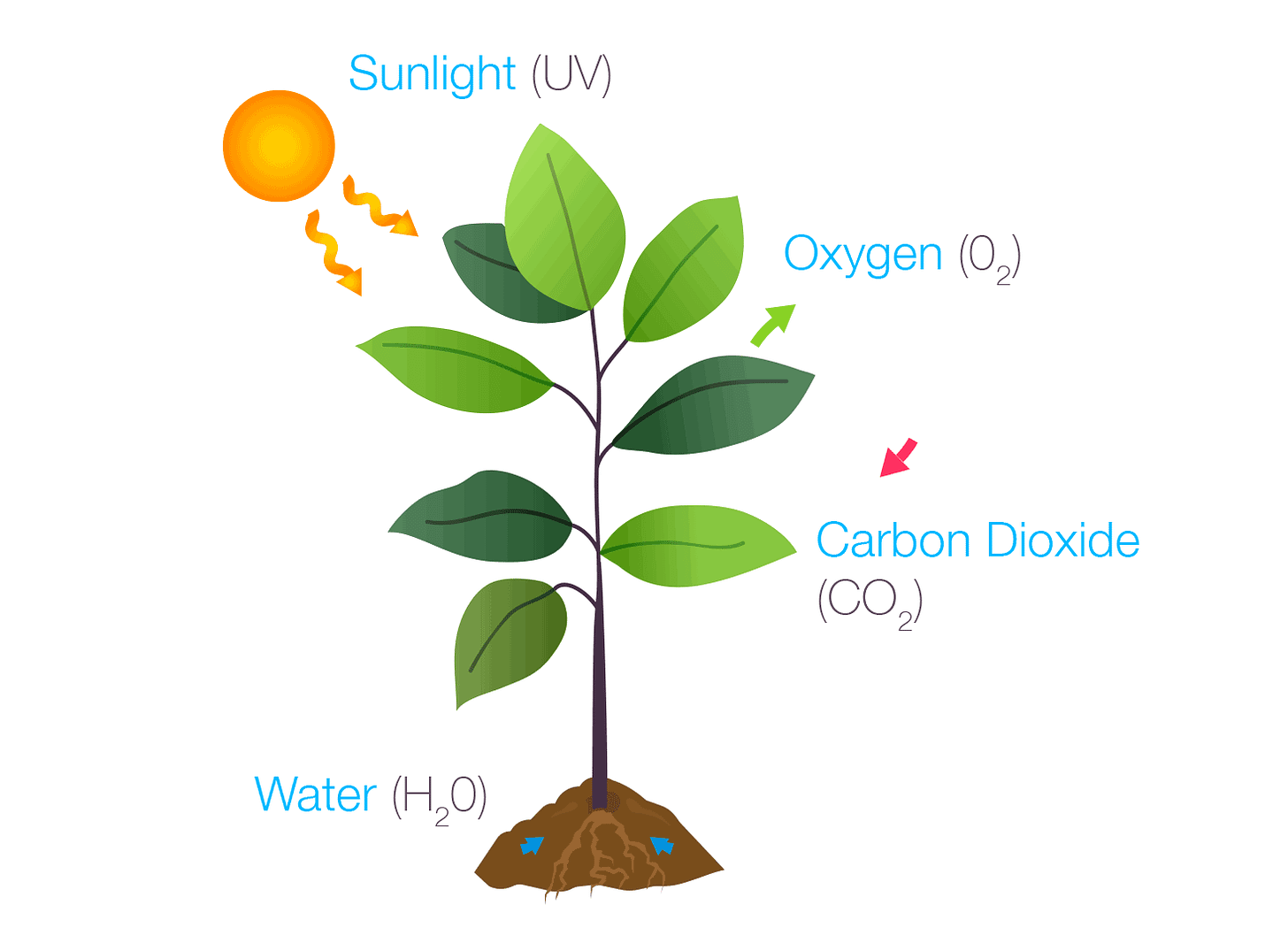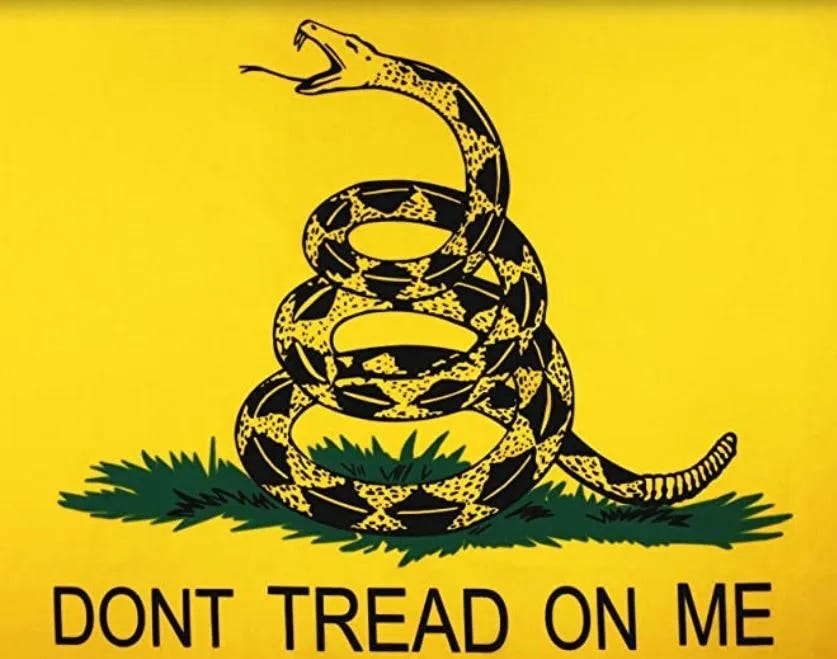The Cobra Effect: Unintended Consequences in Policy Interventions
Examining How Well-Meaning Solutions Can Create Greater Problems Across Various Sectors
Sometimes unintended consequences are catastrophic, sometimes beneficial. Occasionally their impacts are imperceptible, at other times colossal. Large events frequently have a number of unintended consequences, but even small events can trigger them. There are numerous instances of purposeful deeds completely backfiring, causing the exact opposite of what was intended.
William A. Sherden ~ Best Laid Plans: The Tyranny of Unintended Consequences and How to Avoid Them
Words 3,127 | Read Time 15 min | Enjoy
Background
The “Cobra Effect” is a term given to the situation when an attempted solution to a problem inadvertently makes things worse. The term originates in an anecdote from British colonial India, wherein the government wanted to reduce the number of venomous cobras. They initiated a bounty for every cobra killed to encourage people to kill these snakes. The result was unintended—it started rearing the cobras to get the bounty amount. When the government finally realized that and withdrew the bounty, many breeders released their cobras into the wild, so there were more wild cobras than initially.
The Cobra effect is an excellent example of how an ill-designed incentive system can lead to the disquieting possibility that the response to a problem may cause new problems, often much larger than the one at hand. This example illustrates to policymakers and organizations how thinking through consequences is crucial to solving a problem.
Introduction
The quest for progress often makes policymakers adopt well-intentioned solutions to address problems besetting society and the environment. However, as this concept of the “Cobra Effect” is showing, sometimes these interventions create a side effect that is unanticipated and counterproductive, a vicious circle that defeats their very intentions. From the shift to biofuels that are supposed to stem climate change to the spread of wind energy, from immigration policies to address inclusivity, the complexities of human behavior and ecological systems often lead to outcomes opposite from perceived gains.
The essay now proceeds to examine a range of policy initiatives, including biofuels, wind energy, immigration, coal transition, gender affirmation, universal basic income, police defunding, and socialism, which have been implemented with the best of intentions but have given rise to unexpected problems. The forthcoming case studies will demonstrate in detail the complexity of interactions between intentions and impacts that form a rich tapestry to explain how solutions to improve the world can often contribute to problems we already have and how thoughtfully and inclusively designed policies are paramount.
The Issues
Bio Fuels
Various countries have initiated using biofuels manufactured from crops such as corn and palm oil instead of coal to reduce greenhouse gas emissions. However, biofuels are in high demand and have significant unintended consequences. Farmers started changing forests and grasslands into biofuel crop production lands, destroying habitat. These actions release substantial quantities of carbon dioxide locked up in trees and soil, offsetting the intended reduction in biofuel emissions.
In this case, a well-meaning push towards net zero emissions through biofuels contributed inadvertently to environmental degradation and a net increase in emissions rather than the desired reduction—a prime example of the Cobra Effect. It is all about Climate Change Control of the Peoples.
Windmills
Many governments have promoted large-scale wind farms on land and offshore to meet ambitious net-zero targets. While wind energy is renewable, thereby helping reduce dependence on fossil fuels, its expansion by the setting up new wind turbines has been particularly detrimental to wildlife and ecosystems. Offshore wind farms have caused marine life disruption with changes in habitats, underwater noise, and interference with migratory patterns of fishes and marine mammals. Wind turbines on land have destroyed natural habitats, with much land cleared for installation; thus, they have displaced local wildlife and their habitats.
Wind turbines kill several thousand birds and bats, primarily migratory, annually due to collisions with turbine blades. This unplanned effect frustrates the biodiversity process and seriously threatens the survival of already endangered species, further destabilizing the ecosystem.
Thus, while wind energy is being promoted to reduce carbon emissions, its negative impact on wildlife, ecosystems, and land use has caused environmental damage. This is the opposite of sustainability’s objective—a clear example of the Cobra Effect. The bottom line: you are being Railroaded by Windmills.
Immigration
Most countries have opened borders to take in refugees, provide shelter, and add to the culture. However, these well-intentioned policies have brought unintended social, economic, and political changes. That may be manifest, for example, by large-scale rapid migration placing pressures on public services, like health care, education, and housing, which need more resources to handle access. Such outcomes may lead to school overcrowding, overburdened healthcare systems, and inadequacy in the supply of affordable housing altogether, affecting the quality of life for both migrants and native-born populations.
The dopey do-good attitude may further be the root of social tensions, high unemployment, and even crimes in quarters where migrants fail to get assimilated into the workforce due to one reason or another, such as a language barrier, cultural differences, or lack of available opportunities. That has provoked a justified backlash by those affected by unfettered immigration, mobilized anti-immigrant sentiment, and movements that resort to claims for the restriction of immigration to the detriment of the original humanitarian intentions.
Therefore, the motive is to grant asylum and rejoice in pluralism through unrestricted immigration. Unfortunately, because no one was ever ready for its implications, the results have led to social unrest, political splits, and a mounting burden on public service. Moreover, it is an invasion. There, I said it.
Coal
Under the goal of achieving net zero, most countries have gradually moved away from coal as a source of fuel and an increase in other fuels, such as ethanol and liquid propane gas (LPG). Although these efforts were to cut carbon emissions and purify the air, replacing coal with these hazardous alternatives has brought about grave new dangers, primarily in rail transport. Ethanol and LPG are highly flammable and volatile products that pose the threat of transport-related accidents much more seriously than coal. Spillage or an accident involving ethanol or LPG could lead to significant and fatal fire disasters with the occurrence of explosions and severe environmental deterioration, mainly if transported by rail.
Conversely, coal is much safer to transport by rail, being a very stable and non-flammable material. It does not pose a fire or explosion hazard, even in the most severe derailment event. Besides, due to modern technology, coal can be burned cleanly with state-of-the-art scrubbers, further reducing harmful emissions while creating valuable by-products, such as gypsum, used in construction materials. Proper controls mean that coal can be handled and utilized with minimal environmental impact.
But in ridding the rails of coal, replacing it with ethanol, LPG, and other volatile substances, the rail system has been made far more hazardous, putting communities throughout the country in harm’s way with a whole new set of environmental and safety concerns. Ironically, this again results from well-meaning efforts to rid itself of coal. Still, since the railroads handle a dwindling amount of coal, the risks are now even more significant, the so-called Cobra Effect, wherein a proposed solution exacerbates the problem intended to alleviate. Coal is king! Fred is a climate denier!
Nasty Gender Affirmation
Medical intervention by hormonal treatments and surgeries is the principal means of affirming one’s gender for psychological relief and fulfillment. Such medical treatments have lifelong consequences, both physically and psychologically. The resultant effects of hormone therapy and surgical procedures are irreversible, including infertility and reduction of procreative capability. On a broader social level, this can lead to a country’s birth rate decline, especially in places already threatened demographically by an aging population and meager fertility rates.
Research simultaneously conducted reveals that certain persons who have undergone gender transition feel regret or worsening of their mental health condition over time, developing heightened vulnerability to depression, anxiety, or dissatisfaction, which is adverse to the purpose of attempting to enhance their well-being.
The rising demand associated with treatments for gender affirmation has also spread the resources of healthcare systems too thin, often at the expense of other medical needs. Specialized care, including psychological services, surgeries, and hormonal treatments-often requiring long-term commitment, may need great lengths of time, funding, and medical expertise. This further strains the already burdened public health services, taking away the much-needed concentration on other serious health concerns and possibly leading to longer times and reduced access to care by the general population.
While the intent of the support for gender affirmation is (laughably) laudable in promoting inclusivity and well-being, the Cobra Effect kicks in. Reduced fertility, mental health complications, and strained healthcare resources provide a classical exemplar of how the solution creates new problems and harms that undermine the original goofy “good” intentions. The "Ethics" of Child Gender Reassignment is a new Frankenstein’s monster.
Universal Basic Income
The essence of Universal Basic Income (UBI) is to ensure that all have some basic income to support themselves and live equitably in a world where automation is rapidly reducing the number of jobs available. Admittedly, offering income security without the expectation of work has unappreciated effects; it leads to laziness in seeking jobs. That, in turn, reduces overall labor force participation, particularly in the low-wage sector, since one would find it more lucrative to depend on the UBI instead of seeking those less desirable jobs. Such reduced workforce participation, over time, has implications in terms of economic growth and productivity, given fewer individuals would participate actively in productive employment.
Besides that, financing the UBI system involves vast public resources through increased taxation or deficit spending. While governments raise taxes to cover this cost, businesses and people may face heavier tax burdens, discouraging them from investing and innovating. That would retard economic growth and might give rise to inflation, as the supply of labor or production does not rise proportionately with increased demand for goods and services created by UBI. Inflation reduces the value of the basic income that UBI provides, thus making it ineffective and leaving recipients no better off.
Also, large-scale diversion of public funds for UBI support may heighten pressure on other social programs, reducing the resources allocated to education, healthcare, and infrastructure development. This reallocation of resources can also deepen inequalities in different spheres, as critical services get underfunded and access to quality education or healthcare becomes acutely limited.
While UBI supposedly provides financial security and reduces inequality, it risks discouraging work, slowing economic growth, driving inflation, and straining other essential public services. These unintended consequences are an excellent example of the Cobra Effect, in which the solution inadvertently creates new problems that undermine its original goals. The same thing applies to reprehensible “reparations.”
Dopey Defund the Police
The projected goal of defunding the police is not precisely to shift money away from law enforcement but to social services (word salad). That includes mental health support, education, and community programs. It is about the sexual dogmatic belief that by addressing the root causes of crime, violence will decrease, and safety will increase. The tangible result of such policy, if not a few idealistic and theoretic postulates, is that fewer officers, less training, and, in general, reduced resources for police agencies result in higher rates of crimes in so many areas. Fewer officers mean delays in the response to emergencies and less police presence in the community, encouraging criminal activities by increasing brazenness and decreasing deterrence.
That has set a self-contradictory circle in which it reduces police violence and secures the community. Still, in many cases, such actions have translated into more crime, even violent ones, leaving residents-particularly those living in vulnerable neighborhoods feeling less safe. This increase in crime affects the very communities the defunding movement is trying to save, therefore inflating feelings of insecurity and injustice.
The lack of police also places additional burdens on other public services. For instance, the mental health specialists and social workers responsible for handling non-violent crises may be ill-prepared to handle violent suspects, which creates a genuine danger both to themselves and the public. Where the relevant law enforcement authorities need to support such services adequately, they are likely to become overwhelmed and incapable of effectively addressing the higher number of calls they have received due to the decreased police presence.
The intent of defunding the police is the fiat noble goal of safer, more just communities. The effect is skyrocketing crime, slower times to respond to emergencies, and overburdened social services. These merely manifest the Cobra Effect: a proposed solution to alleviate specific problems exacerbates them. “Fiery but most peaceful protests” constitute crummy collectivist crapola.
Socialism
Socialism, in its ideological form, attempts to distribute wealth and resources more equitably among its population. It tries to balance the minimum level everybody would get regarding healthcare, education, and housing, thus eliminating inequality, creating a just society, and caring for the vulnerable classes. However, in practice, many socialist policies lead to highly unintentional and self-defeating consequences for just those goals.
One major issue with socialism is that it may reduce productivity and innovation by removing the profit incentive. In a regime with wealth redistribution and resources centrally controlled, people’s and businesses’ urge to work harder or innovate would be minimal since the chances of benefits from such efforts are slim. All this leads to lower economic output, stagnation, and inefficiency, ultimately lowering living standards.
Additionally, shortages and inefficient resource allocation follow suit whenever the government takes commanding heights in strategic industries or overregulates markets. Furthermore, in countries with significant socialist policy implementation, there are consumer goods shortages, extended wait times for health care, and deteriorating public services as governments prove incapable of allocating resources proficiently. That may continue to frustrate people everywhere by lowering the standard of living and eroding the citizenry’s confidence in the system.
Moreover, the broad-based redistribution of wealth called for under socialism usually translates into higher taxes, which can scare away businesses and individuals generating economic gains. That diminishes the tax base, leading to a vicious cycle in which revenues decrease while the demand for social services increases, and the government cannot afford these programs.
In principle, while well-meant for equality and social justice, the drive towards socialism results in economic inefficiency, shortages, and a disincentive to work and innovate. These constitute what is called, quite appropriately, the Cobra Effect, where policies meant to fix society create new problems and worsen the very challenges it sought to overcome. It is all about Nasty Nanny State Nanny Care.
Reflection
The “Cobra Effect” discussion reveals a striking paradox in contemporary policymaking: well-intentioned interventions often lead to unintended consequences that can exacerbate the problems they seek to resolve. This recurring theme raises an unsettling question: are these outcomes purely the result of flawed planning and oversight, or might they be part of a more significant, intentional effort to reshape society under a Nasty New World Order?
The myriad examples of the Cobra Effect in action—from biofuels leading to habitat destruction to immigration policies fostering social unrest—suggest a systemic issue in how policies are conceived and implemented. It is conceivable that these adverse outcomes could serve as a smokescreen, obscuring a more insidious agenda. For instance, the push for renewable energy might not just be a response to climate change. Still, it could also align with broader economic transformations that prioritize corporate interests under the guise of environmentalism.
Consider the promotion of Universal Basic Income and the defunding of police. While framed as efforts to provide security and equality, they may inadvertently weaken societal structures, creating a vacuum that more authoritarian governance models could fill. A less engaged populace, lulled into complacency by guaranteed income, or communities facing escalating crime without police support could unwittingly invite greater oversight and control from state authorities, facilitating a shift toward a more centralized, potentially authoritarian regime.
Similarly, the ideological drive towards socialism, despite its noble intentions of equity and justice, often leads to economic inefficiencies and resource shortages. Such outcomes fuel discontent and social division, ultimately fostering an environment where extreme measures are justified to restore order and stability. The economic, social, or environmental crisis narrative has historically been a catalyst for sweeping governance and societal structure changes, often at the cost of individual freedoms.
Furthermore, the implications of gender affirmation policies and coal transitions reveal a potential trend toward social engineering that prioritizes ideological conformity over pragmatic governance. As societies grapple with complex identity issues and environmental responsibilities, the elites relish these policies’ consequences to manipulate a further narrative that seeks to control public discourse and limit dissenting opinions.
In summary, while the Cobra Effect exemplifies the pitfalls of ill-considered policies, it also prompts a reflection on the possibility that these adverse outcomes may not be entirely unintentional. They might serve as catalysts for a New World Order, where crises enable the consolidation of power and the redefinition of societal norms. The challenge lies in recognizing these patterns and fostering a critical discourse that interrogates the true motivations behind policy decisions. Ultimately, genuine progress requires a vigilant and informed citizenry capable of discerning the fine line between well-intended reforms and the potential for a more controlled, homogenized future.
Conclusion
A range of policies has one thing in common: what might be called the “Cobra Effect,” where solutions that are meant well enough bring forth downright hostile results. From the biofuel push to wind energy expansion, immigration reform, and socially corrective equity, each represents one degree of failure after another concerning how human systems are intertwined and strike a balance between interference and consequence. These policies, intended to further sustainability, inclusiveness, and security, simultaneously created other problems that worked against their goals.
Our policymakers must consider ripple effects when developing solutions to burning issues. It means careful, thorough impact assessments where the interests of diverse stakeholders get consideration and flexibility in the face of unintended outcomes. Ultimately, good governance requires vision and a commitment to learning from our mistakes so that pursuing progress does not lead us further down paths of more significant harm. By cultivating practices of critical assessment and adaptive management, we could strive toward more authentic effectiveness that better aligns our positive intent with positive impacts on people and the natural environment.
Parting Shot
Listen up, grown-up, collectivist children: carbon dioxide is a plant life food that produces oxygen. It is called photosynthesis.
Anti-Woke Closing
Play it often; play it loud! Fully enjoy irritating the Willfully Overlooking Known Evil (WOKE) ecosystem. 📕
I warmly encourage you to consider becoming a paid subscriber if you have the means. Tips are appreciated, too. Regardless of your choice, your support is deeply appreciated. From the bottom of my heart, thank you for your invaluable support!










I have pointed out that financial regulation has a history of unintended consequences.
https://arnoldkling.com/essays/papers/chess.html
if these "policy makers" and communist ideologues would read Chesterton's Fence they might learn something. I suppose that's a bridge to far when the objective is to destroy America.